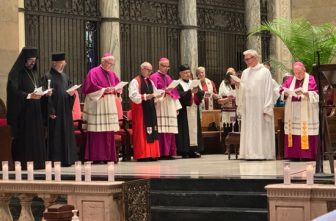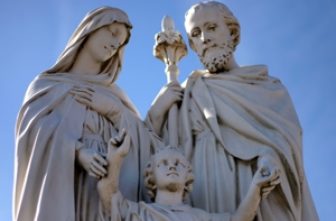In addressing recent controversy, archbishop calls for independent review of Archbishop Viganò’s claims, announces Holy Hour
As calls have come from across the United States for Church officials to demonstrate “actions,” not just words or prayers, to end clergy sexual abuse and cover-ups, Archbishop Bernard Hebda of St. Paul and Minneapolis reiterated in an Aug. 31 statement what his archdiocese is doing to protect children and hold perpetrators responsible.
He began, however, with a recognition of the hurt that recent revelations may have caused for sexual abuse survivors.
“In the aftermath of the demoralizing Pennsylvania grand jury report and the troubling claims made by our former nuncio, Archbishop [Carlo Maria] Viganò, much has been said about the scandals in our Church — worldwide and here in Minnesota,” he said. “I can only imagine how jarring those reports must be for those who have survived abuse and for their families. I am sorry for the harm inflicted and the ongoing pain caused to so many.”
He said that he has heard from “many concerned people: young parents worried about the safety of their children, seasoned parishioners wondering when this crisis may end, priests asking how they can serve their parishioners when they themselves no longer know who is trustworthy, and bishops regretting that we were so slow to seek the help of lay experts — and act with fuller transparency.”
He continued: “In the midst of this darkness, it is the Lord’s promise that he will be with us always (Mt 28:20), that he will never abandon his Church, that gives me hope. As the darkness of the past is brought to light, I am trusting in St. Paul’s insight that what is illuminated will itself be light (Eph 5:13).”
He announced that the Archdiocese will host a Holy Hour of reparation and prayers for healing at the Cathedral of St. Paul in St. Paul at 11 a.m. Sept. 15, the Memorial of Our Lady of Sorrows.
Archbishop Viganò controversy
In the statement, Archbishop Hebda briefly addressed recent allegations leveled by retired U.S. nuncio Archbishop Viganò that high-level Church officials, including Pope Francis, were aware of former-Cardinal Theodore McCarrick’s sexual misconduct, but turned a blind eye. In a lengthy statement released Aug. 25, Archbishop Viganò called for Pope Francis and other prelates who covered up Archbishop McCarrick’s behavior to resign.
When asked about the accusation, Pope Francis told journalists, “Read the statement carefully and make your own judgment.”
In his statement, Archbishop Hebda said an independent outside review would be required to resolve the questions raised by the former nuncio
“Having had good reasons to place my trust in both Pope Francis and Archbishop Viganò, I am personally at a loss as to how to evaluate the claims that have been made by the archbishop,” he said. “Based on my experience in this archdiocese, I believe that some form of an independent review led by credible outsiders is the only way to resolve such situations and restore trust.”
Archbishop Viganò’s letter prompted his critics to revive accusations that he acted to end the Archdiocese of St. Paul and Minneapolis’ 2014 investigation of sexual misconduct allegations against Archbishop John Nienstedt. Archbishop Hebda did not address that controversy, but Auxiliary Bishop Andrew Cozzens, who was involved in the investigation, shared his perspective in a separate statement, also released Aug. 31.
In his statement, Archbishop Hebda said that he aimed to locally contextualize the recent clergy sexual abuse scandals and “reaffirm publicly both our commitment to justice and healing for those who have been harmed and our conviction that abuse can never be tolerated” but that he “[knows] full well that mere words and apologies ring hollow unless accompanied by actions.”
“Working with the lay volunteers on our archdiocesan Ministerial Review Board, corporate board of directors and finance council, along with many other volunteers, employees and clergy throughout the archdiocese, we have constructively and openly confronted our failures — the failures that led to criminal and civil charges, bankruptcy, a loss of trust and a weakening of our moral voice.”
He continued, “Although we have more to do, we have come a long way. In 2015, we entered into a far-reaching settlement agreement with the Ramsey County Attorney’s Office that requires us to take verifiable actions to prevent future abuses. The agreement has improved the way we respond to victim/survivors; the way we hold priests accountable; the way we accept, prepare and promote seminarians; the way we train our priests, employees and volunteers; and how we educate our children and youth in every parish and school in the archdiocese. It has helped to improve our culture. We have not only abided by that agreement, but have done more than it requires. This has been verified in court every six months.
“More recently, we worked with victim survivors to file a joint plan in the bankruptcy court that financially compensates those who have been harmed in our archdiocese. We have also changed our governance within the archdiocese, embracing greater involvement and collaboration between the corporate board and finance council, which assures greater oversight by lay leaders.”
Hope to benefit broader Church
Archbishop Hebda said that the archdiocese “cannot rest on these actions alone.”
“There will be challenges in the future, but we now draw on the expertise of a broad range of individuals, primarily laity, to address those issues with integrity, objectivity and transparency,” he said. “It is my hope that what has been learned here can serve the broader Church nationally and internationally.”
On bishop accountability, Archbishop Hebda said that the archdiocese’s 2015 settlement agreement with the Ramsey County Attorney’s Office requires that if an allegation of misconduct is brought against an archbishop or auxiliary bishop, the director of the office of ministerial standards — currently Tim O’Malley — is required to notify the archdiocesan board of directors, which includes lay leaders.
“Thus, the allegation is made known to lay leadership who have duties to provide oversight and fulfill their fiduciary responsibilities,” he said. “Moreover, a claim today cannot be settled without the knowledge and involvement of our lay leaders. Both of those measures of accountability are new, and critically important.”
Archbishop Hebda said that he also supports engaging lay leadership for bishop accountability worldwide.
“Church leaders must be judged by outsiders who have the independence, objectivity and expertise to be fair and credible. We need the assurance that any cleric — whether a newly ordained priest or a pope — who abused minors or knowingly protected or enabled such abusers, will be held accountable. The same is true for those who abuse their position to take advantage of vulnerable adults, persons receiving spiritual care or seminarians.”
He suggested that an “oversight board similar in make-up, independence and authority to our archdiocesan Ministerial Review Board should be empaneled to address accusations of misconduct by bishops and archbishops.”
“We would also benefit from the appointment of a number of trusted outsiders who can assist those who have grievances,” he added, pointing to former Hennepin County Attorney Tom Johnson. Since January, Johnson has served as an independent ombudsman to assist clergy abuse survivors in the archdiocese, “giving those aggrieved a safe avenue for pursuing claims without fear of repercussions,” the archbishop said.
Archbishop Hebda said he is “fully committed to the course we are on to correct our failings, advance accountability, assist those harmed and prevent future abuse.”
“I realize that I am far from perfect, but I always try to act to the best of my ability and with integrity, collaborating with the many hardworking and committed individuals in this archdiocese who contribute every day to making our Church a better place through their steadfast dedication to safe environments and the Gospel,” he said.



